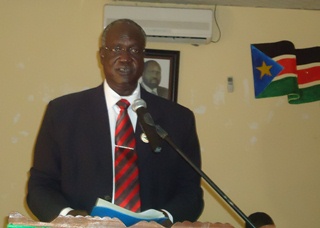Don’t blame SPLM for sufferings in South Sudan, says official
December 21, 2022 (JUBA) – The conflicts and suffering in South Sudan are God’s plans in the bible, not failures of the country’s ruling party (SPLM), a senior official said.
“I am not frustrated with the current situation – the wars. I tell people we [SPLM] are not responsible and not to be blamed for this insecurity. This is something prophesied by Prophet Isaiah. God punished Sudan and we are the Sudanese,” Gen. Kuol Manyang Juuk, a senior presidential advisor remarked on Sunday.
He was speaking during a thanksgiving ceremony organized to welcome Stephen Dheiu Dau, a former minister who was appointed member of the SPLM leadership.
Juuk described the situation in the country as a “foretold biblical curse”, stressing that the SPLM cannot be blamed for what is unfolding.
He said the curse would continue until God intervenes for an end to the situation.
“We knew very well Sudan has been cursed in the bible. So, this curse continues to be until the time God will say enough is enough, now then the people of South Sudan become free, I don’t blame us as a punishment of God,” stressed Juuk.
He added, “And how did God know that there is a country that was going to be called Sudan at that time, even when we had not yet become independent?
At least 166 civilians have reportedly been killed and 237 injured in the last four months as clashes have intensified between armed elements, and between rival community-based militias in the region while more than 20,000 people have been displaced due to the violence since August.
In October, the United Nations appealed for concerted efforts to address the root causes of food insecurity and malnutrition in South Sudan.
According to the world body, severe, multiyear flood events, surging subnational violence, and economic pressures are pushing more people into worsening levels of acute food insecurity, a key driver of childhood malnutrition, disease, and poverty.
Despite being dependent on food imports, South Sudan has enormous potential to produce food and become a ‘breadbasket’ of East Africa, the United Nations Food and Agriculture Organization of the United Nations (FAO), United Nations International Children’s Emergency Fund (UNICEF) and the World Food Programme (WFP) said.
(ST)

